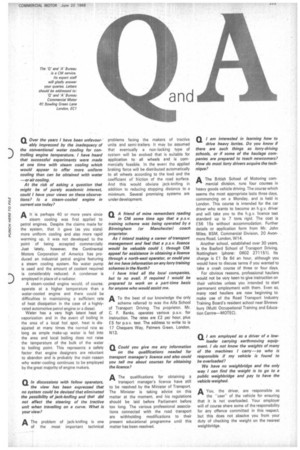Q Over the years I have been unfavour-• ably impressed
Page 225

If you've noticed an error in this article please click here to report it so we can fix it.
by the inadequacy of the conventional water cooling for controlling engine temperature. I have heard that successful experiments were made at one time with steam cooling which would appear to offer more uniform cooling than can be obtained with water —or air cooling.
At the risk of asking a question that might be of purely academic interest, could I have your views on these observations? Is a steam-cooled engine in current use today?
AIt is perhaps 40 or more years since
steam cooling was first applied to petrol engines. Despite the claims made for the system, that it gave (as you state) more uniform cooling and also more rapid warming up, it was not developed to the point of being accepted commercially Just lately, however, the Continental Motors Corporation of America has produced an industrial petrol engine featuring a steam cooling system. No water pump is used and the amount of coolant required is considerably reduced. A condenser is employed in place of a radiator.
A steam-cooled engine would, of course, operate at a higher temperature than a water-cooled engine and there could be difficulties in maintaining a sufficient rate of heat dissipation in the case of a highlyrated automotive petrol engine or a diesel.
Water has a very high latent heat of vaporization and in the event of boiling in the area of a local hot spot, heat is dissipated at many times the normal rate so long as ample make-up water is fed into the area and local boiling does not raise the temperature of the bulk of the water to boiling point. This represents a safety factor that engine designers are reluctant to abandon and is probably the main reason why water-cooling continues to be employed by the great majority of engine makers.










































































































































































































































































